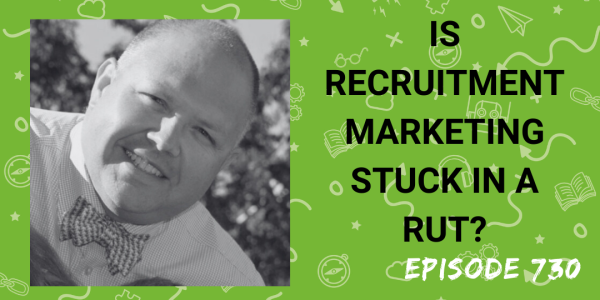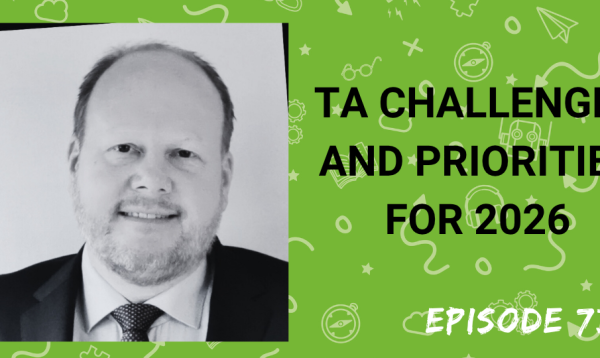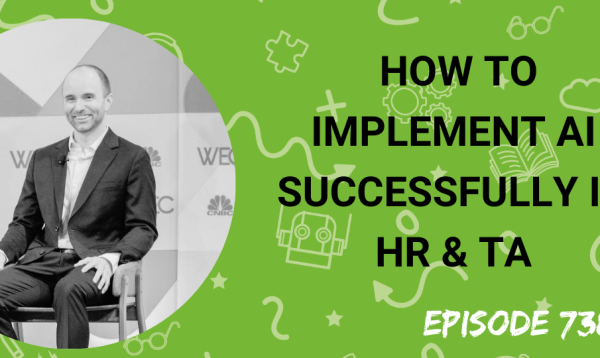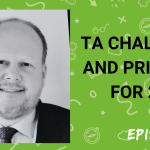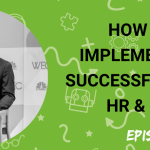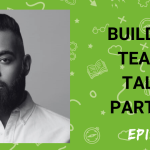Jobseeker behavior is changing with Gen AI and social media becoming ever stronger forces of influencers in career choices. However, a lot of recruitment marketing activity is failing to keep up with employers stuck in a rut and not casting the net wide enough or in the right way.
Shockingly, many TA teams still lack basic visibility into their recruitment marketing metrics and can’t prove ROI to their CFOs. While candidates increasingly use ChatGPT for job searches, few employers have optimized their content for AI discovery, and many career sites still remain conversion killers.
So what should employers be doing, and how can they prepare for 2026?
My guest this week is Neil Costa, Founder and CEO of HireClix. In our conversation, Neil reveals the stark reality of where most organizations actually are with their recruitment marketing efforts and offers some valuable advice on how they should be moving forward.
In the interview, we discuss:
• The current challenges in recruitment marketing
• How employers need to stand out and appeal to a multigenerational audience
• Overreliance on Indeed and LinkedIn
• The role of search and social
• AI optimisation
• Getting a competitive talent advantage
• Keeping marketing momentum with reduced budgets
• The vital importance of metrics and ROI
• The importance of authenticity
• Dynamic personalization and the role of career sites
• What does the future look like
Follow this podcast on Apple Podcasts.
Follow this podcast on Spotify.
00:00
Matt Alder
Is recruitment marketing stuck in a rut? Do employers need to diversify their strategies to keep up with candidate behavior? And what role is AI playing in all of this? Keep listening to find out. Support for this podcast comes from smart recruiters. Are you looking to supercharge your hiring? Meet Winston Smart Recruiter’s AI Powered companion. I’ve had a demo of Winston. The capabilities are extremely powerful and it’s been crafted to elevate hiring to a whole new level. This AI sidekick goes beyond the usual assistant handling all the time consuming admin work so you can focus on connecting with top talent and making better hiring decisions. From screening candidates to scheduling interviews, Winston manages it all with AI precision, keeping the hiring process fast, smart and effective. Head over to smartrecruiters.com and see how Winston can deliver superhuman results.
01:20
Matt Alder
Hi there. Welcome to episode 730 of Recruiting Future with me, Matt Alder. Recruiting Future helps talent acquisition teams drive measurable impact by developing their strategic capability in foresight, influence, talent and technology. If you’re interested in finding out how your TA function measures up in these four critical areas, I’ve created the free Future Fit for the Future assessment. It’ll give you personalized insights to help you build strategic clarity and drive greater impact immediately. Just head over to Mattalder.me/podcast to complete the assessment. It only takes a few minutes. This episode is about talent, influence and technology. Jobseeker behaviour is changing with Gen AI and social media becoming even stronger forces of influence in career choices. However, a lot of recruitment marketing activity is failing to keep up with employers stuck in a rut and not casting the net wide enough or in the right way.
02:29
Matt Alder
Shockingly, many TA teams still lack basic visibility into their recruitment marketing metrics and can’t prove ROI to their stakeholders. While candidates are increasingly using ChatGPT for job searches, few employers have optimised their content for AI discovery and many career sites still remain conversion killers. So what should employers be doing and how can they prepare for 2026? Thanks for having me, I appreciate it. In our conversation, Neil reveals the stark reality of where many organizations actually are with their recruitment marketing efforts and offers valuable advice on how they should be moving forward.
03:15
Matt Alder
Hi Neil and welcome to the podcast.
03:17
Neil Costa
How you doing Matt? My name is Neil Costa and I’m the founder and CEO of Hireclix. Hireclix is a recruitment advertising agency.
03:22
Matt Alder
I started about 15 years ago and been in the online space since the mid-90s and worked at monster.com doing advertising for the Monster brand for a bunch of years before that.
03:26
Neil Costa
So, I mean, it’s a pretty interesting time in recruitment marketing at the moment. Hireclicks is a recruitment advertising agency. I started about 15 years ago and been in the online space since the mid-90s and worked@monster.com doing advertising for the Monster brand for a bunch of years before that.
03:46
Matt Alder
Fantastic. So, I mean, it’s a pretty interesting time in recruitment marketing at the moment. What would you say the biggest challenges are at the moment?
03:56
Neil Costa
Yeah, I mean, I think most TA leaders, even CHROs, have to be thinking about the best ways to, to do two or three things. Like, you know, number one is how do they stand out amongst other employers? You know, how do they tell their stories, how do they attract talent from, you know, several different generations right now and have it all work? I think that’s the number one, you know, challenge that they have. I think second, I think that we’re in a little bit of a, a rut when it comes to how they attract candidates. You know, we’ve got a couple big players like indeed and LinkedIn and they’ve been wonderful sources. But I do think that they kind of dominate how companies find candidates.
04:39
Neil Costa
So I think there’s a real need to think about diversification, you know, how to keep operating on those sites and keep driving candidates. But you know, it’s just like having a stock portfolio that might be over invested in a couple big stocks, like how do I go out and find some other source or signs of life where I can get candidates? And then third is related to AI, you know, what’s going to happen on the AI front from the candidate side, from a operational side, how does it improve my operations, where can I save, where can I better match with candidates? So I think those are the three things that everybody should be worrying about a little bit.
05:11
Matt Alder
So I want to dive into the AI stuff in a second. But before we do, just because it’s kind of a constant discussion that I see people talking about. Indeed. And LinkedIn. And this is changing, that is changing, you know, whatever it might be. And you’re absolutely right, they are the kind of, the sort of the main sources for many, many employers. How can people diversify? What do people need to think about? What works? What approach do you sort of take with your clients?
05:37
Neil Costa
Yeah, usually when we’re looking at that, you know, you’ve got to break it down into several segments. You know, when you think about what can I do what else can I do in the job board space? You know, there, that’s how I think of the first bucket is like, what else can we do in the job board space? You know, in the US we’ve got ZipRecruiter. That’s a big presence, you know, in other markets. You know, if I go down to, you know, number three, four or five, can I get enough volume? Can I get enough quality? So that’s kind of the first chunk or the way that we would look at it. The second is I start looking at search. You know, how do we go into Google? How do we do a better job at competing in Google?
06:11
Neil Costa
I mean, both LinkedIn and Indeed do an amazing job dominating the Google results. And so how do companies go and do that for themselves? I think we’ve been able to, you know, find ways to do that. That’s tough for a TA person. You know, that’s where, you know, you know, when you’ve got the recruitment, marketing agency or internal team that can do that, I think that makes a big impact. And then I think beyond that, you’ve got to start looking at, you know, social and then just consumer media.
06:37
Neil Costa
You know, how do I make sure I know my candidates know where they’re spending time and if they’re spending time on YouTube or if they’re spending time on Spotify or you know, popular science, you know, how do I go out and you know, engage with them and start having, you know, creating brand impressions and calls to action out there. Those three buckets are probably the three different areas that we focus on.
06:58
Matt Alder
Oh, absolutely. And let’s talk about AI because it’s kind of having sort of multiple impacts on everything from search to just everything. I mean, tell us about the impact AI is having and the opportunity that maybe it’s also creating.
07:11
Neil Costa
Yeah, I mean, I think on the front end on the job seeker experience, I think that there’s, I mean it’s just like the wild west, right? It’s just like, you know, there’s agents, there’s what happens on Google now from a summation and zero click perspective, right? Where people are, you know, seeing the summation before without even having to click to a site anymore. And that’s a risk for companies too that want to, you know, get people over to their career site. And so I think from the candidate agent perspective, there’s, I think that’s very unsettled. There’s not like a leader right now that, you know, organizations need to be super worried about.
07:48
Neil Costa
I’d say aside from like ChatGPT and Claude, where just like you make your jobs optimized for Google and other search engines, there are ways to optimize your jobs for ChatGPT and for Claude. And that’s something we’ve started to see change. So I think that’s really the base thing that you could do to get ready.
08:09
Matt Alder
No, absolutely. I think that’s really interesting because I think more and more people are sort of using ChatGPT as a search engine and a single source of truth about recommendations as well.
08:20
Neil Costa
So it’s funny how rapidly the default to like, hey, I’m just to believe everything it throws at me, right, like, you know, and I think that there’s a lot of U utility in it and I think if I was, you know, again, if this was obviously a very different version of Monster back in the day, you know, I mean, this happened where indeed came in and changed how search operated and it really negatively impacted Monster obviously with the most recent, you know, couple months. And I think that there’s risk for, you know, indeed in LinkedIn with how search behavior is changing.
08:52
Neil Costa
And I think that’s a way that, you know, organizations can get ahead if they start thinking about, well, how do I get to those, how do I become populate my jobs, how do I get a presence on Chat, GPT and Claude and other AI search, you know, our AI tools, then it’ll help, you know, give me an advantage and having that direct dialogue with the job seeker.
09:13
Matt Alder
No, absolutely. And obviously in many markets it’s kind of sort of fairly tough economic times at the moment, or uncertain, which is often just as bad when it comes to advertising and marketing. Obviously a lot of employers are under pressure with budgets, but also things taking longer to sign off the things that sort of happen where we’re in this kind of economic phase, as it were. What would your advice be to employees in terms of keeping that momentum going so they can stand out and get the talent they need when they might have reduced budgets or it just takes longer to make decisions.
09:49
Neil Costa
You know, I think in this market, like you said, it’s really dicey and people need to be cautious and rightfully so. But I think that it’s very hard to do so if you don’t have visibility into the metrics of what’s actually happening today. Right? When you have to go and ask a CFO for, you know, an incremental amount of money or a budget or just to re to justify the budget that you had last year or, you know, you’ve got to have the basic numbers behind what’s happening. And I think that we’re, I’m still really surprised when we run into, you know, prospects that they don’t have clear visibility into what they’re getting for the dollars they spend in recruitment, marketing and employer branding.
10:28
Neil Costa
And they’re just, there’s an opportunity to do that, you know, with most, you know, advertising campaigns tied to the ATS data you can usually get, I mean, for most, 99% of our clients, we can tell the story of like, if you spend a dollar, here’s what happens. And I think that in this type of environment, that’s even more important. And, and I think that when you talk about a budget being reduced, like, you know, that’s our job as an agency is to go find the ways to optimize, you know, budget. Like, we’re not just trying to take the dollars and spend them and, you know, give ourselves a pat on the back after we spend it.
11:03
Neil Costa
And you know, this, you’ve been in that, this side of the industry and it’s just, you know, I think what we’re trying to do is we’re trying to optimize campaigns and hey, if we got a cost per hire for, you know, a thousand dollars last year, how do we get it for $750 this year? Because, you know, the money doesn’t, when we look at that optimization, maybe it’s related to budget cuts and we’re able to save the company money and we’re under a lot of pressure to do that. But if we do that and we bring that cost per down and our budget doesn’t go down, that frees up money to go try new things to go try that employer branding on YouTube or Spotify.
11:34
Neil Costa
So I think there’s always, there always needs to be an eye on how do we optimize, how do we get better every, you know, every year, every month, every week.
11:42
Matt Alder
I completely agree with you. And I think the, you know, the tracking thing is interesting as well because, you know, were talking about this, talking about this before were recording. And you know, as you say, you know, my background is in recruitment marketing and you know, I was amazed a long time ago that people weren’t tracking everything that they possibly could. So it’s kind of a shame that’s still, still the case because it’s just so essential in terms of knowing what you’re doing.
12:08
Neil Costa
Yeah, I mean, every other part of the business is not going to be given that kind of grace. Right. Sales, marketing, you know, even it’s just, you know, you’ve got to, these are table stakes for executive conversations and I think that you’ve got to be ready for that. And it’s just hard to go justify a new system, a new advertising campaign, anything if you don’t have the numbers behind, you know, what happened last time or at the very least, what, you know, what do we expect? Right? I mean, people want to, I think if you’re a cfo, you want to see like, well, what do I expect? Like, give me an estimate. And you know, and if it doesn’t work out, that’s fine. That’s, that’s part of marketing. You know, you’ve got to, you’ve just got to know, like, what do we learn?
12:46
Neil Costa
What do we, what do we avoid next time? Or what do we get better at?
12:52
Matt Alder
You mentioned employer branding then. I mean, how is employer branding changing? I hesitate to say the words 2026, but we’re over halfway through the year, so I’m going to say it probably the first time this year. How do people think about employer brand kind of going into the last part of this year and into next year?
13:10
Neil Costa
Yeah, I mean, I think employer branding is really important and I think the, obviously the larger the organizations, the better brand awareness they have and, but it’s still not easy for them to go out there and do that. And I think employer branding is important for every size organization. And I think if you take a real baseline on what people expect, I think they really just need to get a sense of authentic stories from inside the organization. Most people, when they’re looking for a job, they’re exploring an employer and should I work there? They’re trying to find something to relate to. And I think that if there’s one thing that, you know, everybody should be considering in 2026 is like, how do we tell our authentic story? Right. I mean, I think that’s, and there are ways that.
13:56
Neil Costa
The cool part is that there’s clearly very grand and expensive ways to do that with, you know, big video shoots and, you know, lots of creative and lots of spend on consumer media sites and beyond. And, and I think that’s one way to go about it. But I mean, we’ve just had some really nice luck with, you know, creating a very visible and, and strong social media presence for some brands. I mean, we do that for JCPenney and Pfizer. And I think that there’s. There’s really just little nuggets that don’t have to be outrageously expensive in order to tell your story. And I think that’s the number one thing. Once you start telling your stories, once you get that creative, once you can then re. You can then take that and deploy it wherever you’d like.
14:40
Neil Costa
Sometimes that’s social, sometimes that’s on your career site, sometimes that’s out on, you know, consumer media channels. So I think it’s really about getting your story right and then being able to package up the different nuggets of content and deploy it, you know, to whatever degree your budget allows for. And it doesn’t have to be a ton.
14:59
Matt Alder
And I think that, yeah, the big thing there about authentic stories, I don’t think it’s ever been more important because we’re now living in a world just swamps with AI generated. AI generated content and, you know, sort of standing out from that. You know, I’m sure people are looking for humanity and authenticity and all of those things, aren’t they?
15:19
Neil Costa
Yeah, yeah. And we just had a client that we did a career site for, and, you know, the one thing they wanted there was like, we don’t want any stock photo. Like, we just want our people. And I think that’s a, again, a small thing, but a really important thing. And, you know, you know what a pain in the butt that is from getting releases and if someone leaves and you have to rotate them off the site and things like that. But, you know, I think they just want to make sure that it doesn’t even sniff like it’s, you know, a stock or an AI generated image. And I think that’s an important little thing that I think they’re, you know, that we’re all cognizant of when they relaunch their website.
15:57
Matt Alder
And let’s talk about career sites. I mean, where are we with career sites, you know, now? What role are they playing? How are they developing? How should people think about them?
16:05
Neil Costa
Yeah, I mean, I think it’s. It’s probably the most important asset in your TA portfolio. Right. It’s the gateway to getting to know our organization, helping, you know, guide them through, you know, the process of understanding who we are, what we offer. So I think it’s huge. I mean, you know, our. We do offer career sites. We chatted about that. I mean, we got into it about Three years ago, after Matt, I was adamant about just being technology agnostic and not doing career sites. But to be frank, the technology just wasn’t doing what we needed it to do. I mean, at our heart as a marketing agency, we’re trying to create conversions, right? And we do that advertising. We drive people back to a career site. We want that to convert into quality applicants and eventually hires.
16:54
Neil Costa
And I think that we felt like we had to get into the business because weren’t getting the candidate experience we wanted. We weren’t getting the tracking that we needed for the visibility and weren’t getting the integration into the ats. I think now all of those factors, whether it’s our career site or someone else’s career site, you’ve got to be able to have all of that. Like I said, going back to the numbers, you’ve got to have something that’s going to allow you to track. You just can’t have a, I mean, for many years career sites were like, well, you know, the career site gets the credit. You know, that’s, you know, that’s not acceptable. There are many, you know, rivers that flow through the career site.
17:27
Neil Costa
And I think that’s, you know, that’s kind of a, a bit of a, you know, a bit of a misnomer if you just say, well, the career site did all that work. I think that you have to know where the sources are, how the career site converts is really important. And I think that the little things that we’re doing on a career site now that we’re thinking of, you know, what happens when the job wreck, you know, disappears, right? It’s just like a little tiny thing. But like, you know, when there’s some timing element between when it comes off the ATS and it comes off the job, the career site. And you know, we created this thing called second chance Pages. And so if some, the job’s no longer there because let’s face it, you know, recruiters share it on LinkedIn.
18:06
Neil Costa
It’s indexed by Google. It takes a little time for Google to update. When they hit that landing page, they’re presented another, you know, relevant job versus just hitting a 404 error page. And just like little things like that are like, I, you know, I actually care about, you know, what you see when you come to my website. And I think every TA leader, every recruiter should have that sentiment of like, look at, this is like a, this is our this is our front door. Right. We’re going to make it look good and we’re going to give you a great experience. So I think it’s, it’s really.
18:36
Neil Costa
I did this presentation, God, it was at a healthcare HR conference and I asked people in the crowd like, you know, raise your hand if you’re proud of your career site and literally 80, 90% of people didn’t raise their hand. And I think that’s a, that’s a significant deficit at this day and age that we still have people that aren’t proud of the front door.
18:57
Matt Alder
Yeah, and I think you make an excellent point there. We’re talking about marketing and advertising. You know, the destination site, the thing that converts the interest into the apply is a critical part of it and you can’t just sort of divorce it from the campaign. And so, you know, having control over that and also being able to change it and optimize it is just such a big thing. And I think there’s always a long way to go. But I’ve been encouraged by some of the things I’ve seen in kind of recent years with employers really getting that and you know, kind of working it.
19:26
Neil Costa
Well and even there’s, I don’t know if Matt, if you, I mean, I saw an article from Chris Hoyt who was over at Career Crossroads about, you know, indeed’s policy change to basically just send people directly to the ats, you know, and I mean like, look at, people may not feel like this is a big deal, but it really is. It’s somebody dictating what your candidate experience is going to be. And, and I think that Chris brought up so many good points about, you know, the candidate experience, the compliance related issues. Like this is a big deal and this is a, it’s a very bold thing for indeed to assume that they can dictate that. And I think that’s going to be a really interesting challenge over the next few months and probably over into 2026.
20:09
Matt Alder
Yeah, no, absolutely. I mean, I think it’s ultimately, it’s dictating to their customers in a really strange way. So yeah, like you’ll be interested to see how that plays out and also really keen that people educate themselves and find out more about what’s going on. Flipping over to technology stuff a little bit here. So as technology is developing, I think one of the interesting things about recruitment marketing for me has always been the potential of adding kind of more personalization and we kind of see a little bit it’s sometimes on career sites and some of the things you were talking about there. Do you think that we’re going to see more kind of dynamic personalization in recruitment marketing?
20:46
Neil Costa
I think so. I mean, I think, you know, as you’re, I think as consumers go out and do, you know, they have their shopping experiences, their, they’re seeing all kinds of personalization, you know, across the board. And I think that it’s, it’s happening. I know that we do that where we can use first party data from, you know, if a client’s got, you know, a hundred thousand or a million, you know, people in their ats, we can take that data, we can clearly keep it safe and anonymized and go out and target those candidates. And we can target those candidates based on, you know, the job title they applied for, the geography they’re in. So I think that personalization comes in very different forms.
21:20
Neil Costa
And even by spinning out landing pages for certain job categories, you know, for certain nursing categories in certain geographies, even that is a form of personalization. But I think that more likely than not, you’re going to see a continuation in that complexity of how we personalize to candidates. I think it’s just, I think it’ll be something that’s expected and it’ll be like, hey, you know, do you know me or do you not know me as the candidate, you know, looks at an ad or looks at a landing page?
21:51
Matt Alder
No, it’s a slightly broader question really about the future. As a kind of a final question, what do you think the future looks like? Where do you sort of hope, think would like recruitment marketing and employer branding to be in a few years time.
22:06
Neil Costa
Yeah, I mean this is, it’s so funny. Like this is a harder question for me. Like I always, like I think I mentioned you, my roots are in like accounting originally before I get into marketing and like, you know, I’m very like practical and like what can we do this year? And this is, but that being said, like obviously like leading an organization and having our clients ask us is something that’s really important. I, I think that, I think the fluidity of conversations between companies and employees will need to get and what I mean by that is that, you know, if you take a step back on the overall market of, you know, hey, we’re doing recruitment ads and people are trying to apply for jobs, you know, there’s a lot of intermediaries, right? There’s, you know, permanent staffing firms, temporary staffing firms.
22:51
Neil Costa
And I think that the future will break down the barriers between companies and employers. I think there’ll be easier, an easier flow of dialogue, an easier way for candidates to say, these are the things I really want that are personalized for me. And I hope that there is ways for, I think the innovation is around ways that employers can say, like, well, listen, like, you know, we can give you that match. So it’s some, you know, advanced, rapid advancement of personalization and, you know, but between the two, the companies and the employers. So I think that there’s a lot of opportunities there because nobody wants to make a misstep. Right. And I think an employee doesn’t want to take a bad job.
23:31
Neil Costa
A company doesn’t want to hire a bad employee again, meaning not a bad employee like a bad person, but like just a bad fit. So I think that the more that we can do to advance the connections between the employees and the employers, I think the better matches will happen, the better ROI that we’ll get on the technology and the advertising that we invest in. And I think that makes again, the TA team and HR team more efficient and that gives them more resources to go out and again, promote the organization, promote the employer brand.
24:01
Matt Alder
Just head over to Mattalder.me/podcast.
24:04
Neil Costa
Yeah, Matt, I appreciate the opportunity and look forward to doing it again someday.
24:09
Matt Alder
My thanks to Neil. You can search through all the past episodes at recruitingfuture.com where you can also subscribe to our weekly newsletter, Recruiting Future Feast, and get the inside track on everything that’s coming up on the show. Just head over to Mattalder.me/podcast. It only takes a few minutes and you’ll receive valuable insights straight away. You can search through all the past episodes at recruitingfuture.com where you can also subscribe to our weekly newsletter, Recruiting Future Feast, and get the inside track on everything that’s coming up on the show. Thanks very much for listening. I’ll be back next time and I hope you’ll join me.

